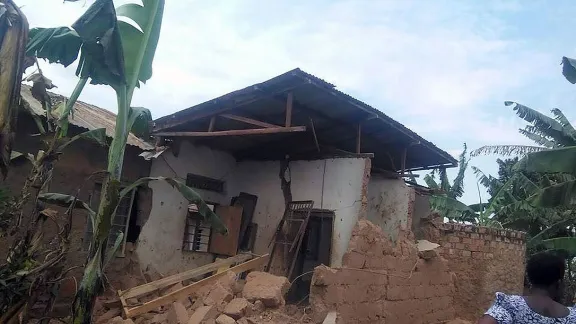
A damaged house in Bukoba. Photo: LWF/TCRS
Bukoba Lutheran Bishop: Many people are “deeply shaken”
(LWI) – The Evangelical Lutheran Church in Tanzania (ELCT) together with its diaconal arm, and The Lutheran World Federation (LWF) are reaching out to families affected by the 5.7 magnitude earthquake that struck the country’s northwestern region on 10 September.
Bishop Dr Abednego M. Keshomshahara of the ELCT North Western Diocese says 16 people died, and many families in Bukoba town and surrounding areas “are in deep shock as they come to terms with the loss and extensive damage.”
The Tanzanian government reports more than 250 people were injured, and hundreds of houses suffered extensive damage or collapsed entirely in the region around Lake Victoria. Tremors were felt as far as neighboring Kenya, Rwanda and Uganda.
A rapid assessment team from the LWF humanitarian program in Uganda traveled to the North-Western diocese to evaluate the damage and the needs to be addressed in the immediate and long-term phase, and to offer support. The World Service program will collaborate with the diocese, ELCT’s diaconal arm, Tanganyika Christian Refugee Services (TCRS) and the local ACT forum.
Urgent need for beddings, food and medicine
“People are deeply shaken. Many survivors fear going to inspect the damage as aftershocks are still being felt from yesterday, and some even this morning,” Bishop Keshomshahara told Lutheran World Information (LWI) earlier today.
“We are beginning to assess the damage now in order to provide the most appropriate response. Most of the houses and buildings here are not built to withstand earthquakes. Some were completely damaged, others have deep cracks and will need to be repaired or totally reconstructed. In the emergency phase, people need help and we are reaching out to encourage community members to offer shelter to those who have lost their homes,” he said.
The LWF/TCRS rapid assessment showed more than 753 houses in Bukoba and Ngara had been completely destroyed and more than 1,037 were damaged. A primary school and dormitory are among institutions that were damaged.
People urgently need beddings, food and medicine in the relief phase. Construction materials such as poles, iron sheets and nails will be needed to repair damaged houses or construct new ones, the team noted.
“Most of the houses and buildings here are not built to withstand earthquakes. Some were completely damaged, others have deep cracks and will need to be repaired or totally reconstructed. In the emergency phase, people need help and we are reaching out to encourage community members to offer shelter to those who have lost their homes.”
Prayers and solidarity
Bishop Keshomshahara said 10 of the severely damaged houses were homes of pastors, evangelists and other church workers, and a Sunday school was also destroyed. “But we expect to discover more damage as we access the communities affected,” he said.
He continued: “People in the community are taking in those who have lost homes, providing beddings, food and so on.”
Part of ELCT’s initial response included prayers held in congregations of the LWF member church this Sunday, and calls for solidarity with those affected.
“This disaster has left the country and the people in deep shock. As a church we showed our support and shared in the sorrow felt by our people around Lake Victoria area by having prayers throughout our congregations this Sunday and inviting other dioceses to provide diaconal support,” said ELCT Presiding Bishop Dr Frederick Shoo.
People are traumatized
“We mourn with those who have lost loved ones, homes and livelihoods. We will continue to accompany them by providing pastoral care. Our response will become more concrete after the assessments currently being conducted,” he added.
The Bukoba diocese general secretary Rev. Elmereck Kigembe said the prayers from other parts of the ELCT were deeply appreciated in the North-Western region. “People are psychologically traumatized to the extent that students in boarding schools since yesterday refused to sleep in dormitories, instead they sleep outside on grounds. Some citizens also have developed fear, and avoid staying inside their houses,” he adds.
Bukoba, the capital city of Tanzania’s Kagera region, has a population of more than 120,000 people. Another 290,000 reside in the rural parts of the district.


